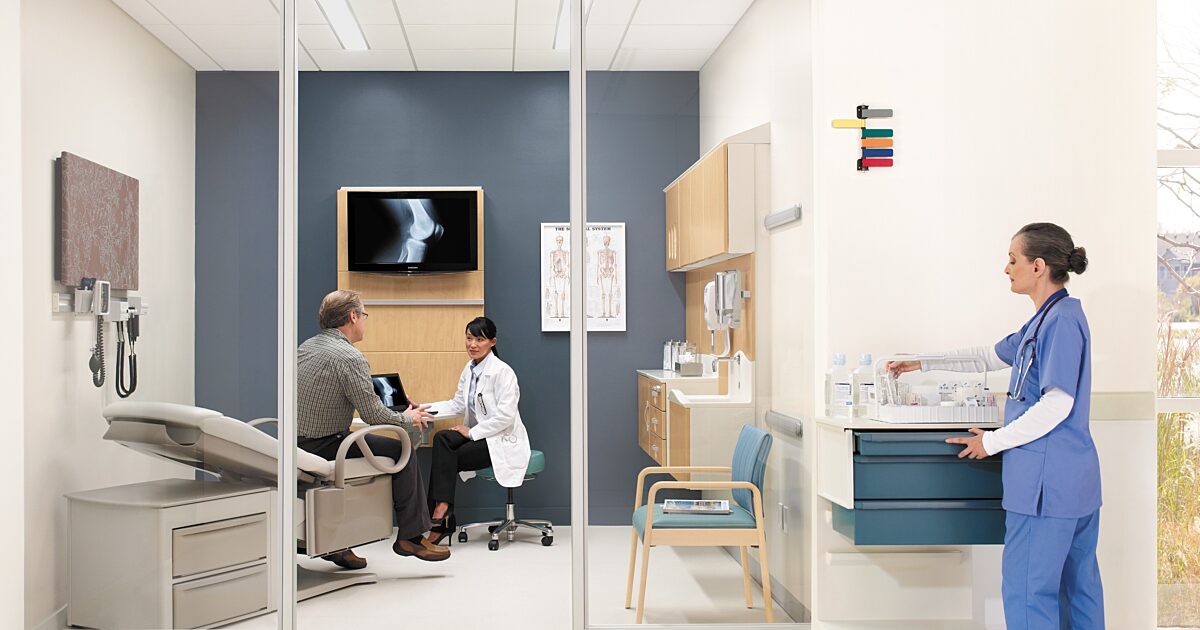
Hospitals are making innovations to establish their facilities as smarter, more intelligent spaces. The topic of smart buildings has been circulating in the commercial real estate industry for some time now, but what does a smart building really mean? According to an article by Healthcare Facilities Today, an intelligent building is created by combining smart software functions with a variety of systems such as environmental controls, security and access features, in addition to integrated data management to name a few. By finding ways to connect the data that is collected from these everyday operations, smart buildings are built with the intention of making end users’ lives easier.
Smart hospitals are the latest and greatest way to incorporate artificial intelligence, electronic capabilities and robotics – and a hospital that embodies all of those things is Cleveland Clinic in Ohio. Cleveland Clinic was recently named number one smart hospital worldwide by Newsweek . Rohit Chandra, PhD, Chief Digital Officer, Cleveland Clinic shares the key factors in ensuring their effectiveness:
"Cleveland Clinic has been committed to utilizing technology for the betterment of our patients and caregivers. From electronic medical records to AI, we have seen how technology can improve care and make the experiences of caregivers and patients smoother and more efficient. As the pace of technology has accelerated, our leadership has made leveraging AI a priority for our organization and has created a team around it."
Chandra outlined the key areas that have made Cleveland Clinic thrive, such as making their hospital operations more efficient, improving the caregiver experience, enhancing patient care and accelerating medical research. While some of their technology has been developed in-house, they have also engaged with partners, such as Palantir and IBM, to help them reach their goals.
Engaging with partners like Palantir and IBM could be key to securing success for smart hospitals. As Healthcare Facilities Today shared in their “Intelligent hospitals: leveraging data to future-proof operations,” article, a smart hospital cannot be smart unless it is actively bettering the lives of people inside it. Their findings suggest that “creating a truly smart hospital requires real people to collaborate with the architects, construction project teams and medical professionals from the beginning to integrate systems.”
In addition to the partners and teams that make smart hospitals successful, it is no surprise that the artificial intelligence implemented to accompany these changes must be thriving. As the Beckers Hospital Review report, “Top health tech hazards of 2025 ,” determined, the number one health technology hazard for 2025 is “risks with AI-enabled health technologies,” ensuring that the artificial intelligence systems installed are safe remains a top priority.
In terms of how Cleveland Clinic has managed these challenges, Chandra weighs in:
“In all of our work, governance is extremely important, and we have created an AI Task Force that evaluates new AI projects to ensure the technology is being used in an appropriate and equitable manner.”
One of the technologies that has helped lead to Cleveland Clinic’s smart hospital advancements is the use of AI scribe. According to a 2024 report by the American Medical Association (AMA), AI scribe helps reduce documentation, saving most physicians one hour a day at the keyboard. AMA determined the following benefits of AI scribe:
- Accuracy
- Ease of use and training (it’s intuitive; “no need to teach 10,000 physicians how to use it”)
- Privacy and security
Chandra explains what has made AI scribe so impactful to their hospital: “The technology ‘listens’ to appointments and creates a draft of a note for providers, that they can then review and add to. This saves them time and allows caregivers to be engaged with the patient, as opposed to typing on their keyboards during appointments. In addition, we are working on a risk-predication tool that can help predict and flag the onset of sepsis.”
While AI scribe and other artificial intelligence systems are helping improve the day-to-day for many physicians, the importance of patient privacy remains prevalent. The Association of American Medical Colleges interviewed James Weinstein, DO, MS, Senior Vice President of Microsoft Healthcare, this past fall in an article to hear his perspective on AI in medical care.
Here are Weinstein’s thoughts: “Good, accurate data are essential to the future of artificial intelligence, if it is to be actionable. But not sharing who owns the data and what you’re going to do with it is not fair.” In essence, Weinstein advocates for a balanced approach, where the technical needs of AI are met without compromising ethical standards. This balance is vital for the sustainable and fair development of AI technologies in healthcare.
Cleveland Clinic was able to adapt these ideals into their smart hospital this year, and as they look ahead, Chandra shares the advice he would give to other healthcare facilities looking to implement smart technologies and AI to enhance their operations and patient care: “The pace of technology is accelerating, and over time, AI will impact everyone. The time to prepare is now – and it’s important to be strategic. There are so many opportunities, but organizations need to determine what areas adoption of new technologies would be most impactful to them. While AI could be costly, there are several options for adoption such as cloud-based solutions, vendor partnerships or embedded technology in enterprise platforms.”
Interested in more content like this? Read our recent articles, Rethinking Hospital Capacity in New York or 3 Perspectives on the Growth of Skilled Nursing Occupancy